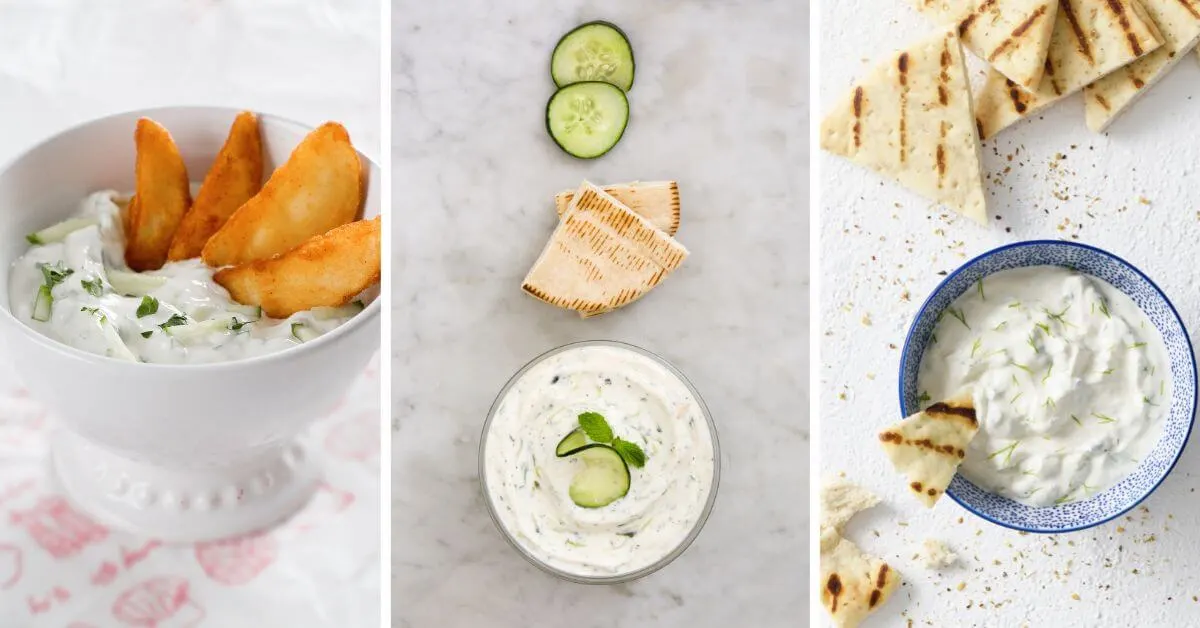Updated May 8, 2023
You may be wondering if you can still enjoy your favorite Mediterranean dishes while pregnant.
Can I eat tzatziki while pregnant, for example?
Tzatziki is a traditional Greek dish made from yogurt, cucumbers, garlic, and olive oil.
It is typically served as a dip or sauce and is a common accompaniment to grilled meats and vegetables.
While its popularity has traditionally been limited to Greece and the Mediterranean region, tzatziki has become increasingly popular in recent years, due in part to its refreshing flavor and health benefits.
Tzatziki is a healthy and delicious dish.
It’s perfect for a light meal or snack.
Tzatziki makes an amazing dip or sauce that you can safely enjoy through your first, second, and third trimester of pregnancy!

Tzatziki is a healthy and delicious dish.
It’s perfect for a light meal or snack.
Tzatziki makes an amazing dip or sauce that you can safely enjoy through your first, second, and third trimester of pregnancy!
Can I eat tzatziki while pregnant?
The answer is yes, you can!
So if you are a fan of Pita Jungle, Cava, or Zoe’s Kitchen know that you can continue to enjoy their delicious Tzaztzki sauces and dips.
You will want to take a few precautions when eating Tzatziki to keep you and your unborn baby safe.
Tzatziki is a traditional Greek dish made from yogurt, cucumbers, garlic, and dill.
Occasionally some tzatziki sauces will also have mint as an ingredient.
That is also safe for pregnant women to consume so no fear if your tzatziki contains mint.
It is typically served as a dip or sauce and can be enjoyed with pita bread or vegetables.
This refreshing cucumber-yogurt dip is a great way to add some flavor to your meals.
While tzatziki is generally considered safe to eat during pregnancy, there are a few potential risks to be aware of.
First, yogurts that are made from unpasteurized milk may contain harmful bacteria that can cause food poisoning.
Secondly, be careful with the amount of garlic you add.
Too much garlic can lead to heartburn and indigestion, both of which are common during pregnancy.
Finally, watch the sodium content of store-bought tzatziki; some brands can be quite high in salt.
If you’re watching your salt intake, it’s best to make your own tzatziki at home using low-sodium yogurt and fresh vegetables
What is tzatziki and what are its health benefits?
Tzatziki is a traditional Greek sauce made from yogurt, cucumbers, garlic, olive oil, and vinegar.
It is often used as a dip for pita bread or as a topping for gyros.
While it is commonly associated with Greek cuisine, tzatziki has become popular in other parts of the world as well.
In addition to its delicious flavor, tzatziki sauce is also packed with health benefits. yogurt, the main ingredient in tzatziki, is a great source of probiotics, protein, and calcium.
Cucumbers are high in water content, making them an excellent choice for hydration.
Furthermore, studies have shown that cucumbers can help to reduce inflammation and improve skin health.
Finally, garlic is rich in antioxidants and has been shown to boost the immune system.
When combined, these ingredients make tzatziki sauce a truly nutritious dish.
How to make tzatziki
Tzatziki is a delicious Greek yogurt-based dip that’s perfect for entertaining.
It’s easy to make and can be served with pita bread, vegetables, or chips.
To make tzatziki, you’ll need Greek yogurt, cucumber, garlic, olive oil, lemon juice, salt, and pepper.
Start by grating the cucumber into a bowl.
Then add the garlic, olive oil, lemon juice, salt, and pepper.
Mix everything together well, and then add the Greek yogurt.
Stir until everything is evenly mixed.
Serve chilled with pita bread or vegetables.
Recipes that include tzatziki:
- Tzatziki dip – a classic that’s always a hit at parties
- Tzatziki pizza – top this gyros pizza with tzatziki for a delicious twist
- Tzatziki pasta – add tzatziki to your favorite pasta dish for extra flavor
- Tzatziki chicken – a healthy and tasty way to cook chicken
- Tzatziki meatballs – a comfort food recipe you’ll want to make again and again!
Is tzatziki pasteurized?
Tzatziki is a traditional Greek sauce or dip made from yogurt, cucumbers, garlic, and olive oil.
It is often served as a starter or side dish with grilled meats or vegetables.
While the exact ingredients may vary depending on the region or household, tzatziki typically contains yogurt that has been pasteurized.
Pasteurization is the process of heating milk to a high temperature in order to kill bacteria and other unsafe microorganisms.
This ensures that the yogurt will be safe to eat and will not cause food poisoning.
As a result, it is generally safe to assume that tzatziki contains pasteurized yogurt.
However, it is always best to check the labels of any store-bought tzatziki before consuming it.
Homemade tzatziki made with unpasteurized yogurt may not be safe to eat.
Can you eat gyros while pregnant?
Gyros are a type of Greek sandwich that typically consists of lamb or chicken, tomatoes, onions, and tzatziki sauce wrapped in a pita.
While they can be a delicious and easy meal option, you may be wondering if it’s safe to eat gyros while pregnant.
Gyros are safe to eat during pregnancy, but there are some things you should keep in mind.
First, be sure to order your gyro without feta cheese.
Feta is a type of cheese that is unpasteurized, which means it can contain harmful bacteria that can cause food poisoning.
You can substitute American or cheddar cheese instead.
Second, ask for your gyro meat to be cooked well-done.
Undercooked meat can also harbor harmful bacteria.
If the meat is cooked all the way through, it should be safe to eat.
However, if the meat is still pink in the middle, it’s best to avoid it as there is a risk of foodborne illness.
Additionally, it’s important to check the ingredients in the tzatziki sauce as some brands may use unpasteurized milk, which can also cause illness.
If you’re unsure about the ingredients or don’t know how the meat was cooked, it’s best to err on the side of caution and avoid gyros while pregnant.
Finally, avoid toppings like onion and garlic, which can trigger heartburn in pregnancy.
If you want to enjoy a gyro during pregnancy, there are a few different ways you can order or prepare it to make sure it is safe to eat.
For example, you can ask for your gyro meat to be grilled instead of fried and skip the onions and garlic in favor of other toppings like lettuce and tomatoes.
If onions and garlic do not give you heartburn, they are safe to have on your gyros.
With a few simple precautions, you can enjoy a delicious and safe gyro during pregnancy.
Can you eat hummus while pregnant?
Pregnancy is an exciting time, but it can also be a time of great uncertainty.
When it comes to food, expectant mothers often have a long list of dos and don’ts.
So, can you eat hummus while pregnant?
The short answer is yes.
Hummus is made from cooked, mashed chickpeas or other beans, tahini, olive oil, lemon juice, and garlic.
It is high in fiber and protein, and it also contains folate, iron, and other important nutrients.
Also, it’s a convenient and tasty way to add more vegetables to your diet.
However, as with any food, it’s important to eat hummus in moderation.
Some brands of hummus may also contain unpasteurized ingredients that can pose a risk for pregnant women.
So be sure to check the label before you buy.
There are some things you should keep in mind when eating hummus during pregnancy.
First, make sure the hummus is properly refrigerated.
Second, avoid eating raw or undercooked chickpeas, as they may contain harmful bacteria.
Finally, if you are ordering hummus at a restaurant, be sure to ask about the ingredients and preparation methods.
Some restaurants use unpasteurized chickpeas or tahini, which can pose a risk to pregnant women.
If you are concerned about food safety, there are a few different ways you can order or prepare hummus that will minimize the risk.
You can look for brands of hummus that use pasteurized chickpeas and tahini, or you can make your own at home using boiled chickpeas and cooked tahini.
Can I eat Mediterranean food while pregnant?
Mediterranean food is a delicious and healthy way to eat during pregnancy.
The diet is based on fruits, vegetables, whole grains, legumes, nuts, olive oil, and fish.
This type of diet has been linked with a lower risk of heart disease, cancer, and diabetes.
Mediterranean food is also high in fiber, which can help to prevent constipation.
When choosing fish, opt for varieties that are low in mercury, such as salmon, trout, and sardines.
Pregnant women should also avoid swordfish, sharks, and tilefish.
When it comes to dairy products, choose low-fat or nonfat options.
Lastly, be sure to drink plenty of water throughout the day to stay hydrated.
Can I eat feta cheese while pregnant?
Feta cheese is typically made with unpasteurized milk, so it is not recommended for pregnant women.
Pregnant women are more susceptible to foodborne illnesses, and feta cheese has a high risk of contamination with listeria.
If you are pregnant and craving feta cheese, look for a pasteurized variety made with pasteurized milk.
Can you eat marinated feta when pregnant?
Pregnant women are often advised to take extra care when it comes to food safety.
This is because their immune systems are suppressed, making them more susceptible to foodborne illness.
As a result, many pregnant women choose to avoid certain foods, such as raw meat and unpasteurized dairy products.
Marinated feta falls into the latter category, as it is typically made with unpasteurized milk.
However, there are a few brands of marinated feta that are made with pasteurized milk, which is safe for pregnant women to consume.
If you’re unsure whether your feta is pasteurized, you can check the label or ask your grocer.
When in doubt, err on the side of caution and avoid marinated feta during pregnancy.
Is tahini safe during pregnancy?
Pregnancy is an exciting time filled with new challenges and changes.
One of the biggest changes is in your diet, as you now have to be extra careful about what you eat to ensure that you and your baby are getting all the nutrients you need.
With so many foods off-limits, it’s natural to wonder if there are any that are safe to eat.
Thankfully, tahini is one food that you can enjoy without worry during pregnancy.
This versatile paste is made from ground sesame seeds, which are a good source of protein, iron, and calcium.
What’s more, tahini is also a rich source of fatty acids, which are essential for fetal development.
Is pita bread safe during pregnancy?
When it comes to pita bread, there’s no need to worry.
This popular type of flatbread is perfectly safe for pregnant women to enjoy.
Pita bread is made from simple ingredients like flour, water, and salt.
It can be enjoyed plain or used as a vehicle for other healthy toppings like hummus or vegetables.
Pita bread is a good source of complex carbohydrates, which can provide energy and promote a feeling of fullness.
Plus, it’s low in fat and calories, making it a wise choice if you’re watching your weight during pregnancy
Can you eat falafel when pregnant?
Falafel is a popular dish made from chickpeas or fava beans that are ground into a paste and formed into balls or patties.
It is usually fried or baked and served in pita bread with salad and yogurt sauce.
Falafel is generally considered safe to eat during pregnancy, as long as it is cooked properly.
Chickpeas and fava beans are both good sources of protein, fiber, and folate, which are essential for the development of the fetal brain and nervous system.
However, it is important to make sure that the falafel is cooked all the way through, as undercooked beans can contain harmful bacteria.
If you are unsure about the cooking methods used at a particular restaurant, it may be best to avoid eating falafel while pregnant.
Are you allowed to eat Greek yogurt when pregnant?
Yes! you can eat Greek yogurt while pregnant.
Greek yogurt is perfectly safe for pregnant women to eat.
In fact, it can be a helpful addition to your diet. Greek yogurt contains probiotics, which are live bacteria that help to promote a healthy digestive system.
These probiotics can also help to prevent the growth of harmful bacteria in the gut.
Additionally, Greek yogurt is an excellent source of calcium, which is essential for the development of strong bones and teeth.
When choosing Greek yogurt make sure to pick brands that use pasteurized milk to make the yogurt.
Unpasteurized greek yogurt should be labeled as such, but it is important to double-check during pregnancy.
Most Common Food-Borne Illnesses
- Listeria
- Salmonella
- E Coli
- Mold
- Campylobacter
- Botulism
These pathogenic bacteria can be found in foods that are not kept at the proper temperature, stored improperly, or that are undercooked.
To reduce your risk of foodborne illness during pregnancy you want to pay close attention to how you prepare, cook and store the foods you eat
Common symptoms of foodborne illness from undercooked meats are:
- Nausea
- Vomiting
- Diarrhea
- Stomach cramps
- Fever
List of foods to not eat when pregnant:
- Foods that are not pasteurized– certain types of cheese like soft cheeses, Brie, Blue Cheese, etc.
- Certain types of fish– shark, swordfish, anything high in mercury
- Raw eggs including hollandaise sauce, homemade mayonnaise, homemade eggnog, and runny eggs.
- Undercooked meats– lunch meats. Deli meats.
- Hot foods that are not “hot”, avoid hot foods that have been sitting out without a warming source. Same for foods that should be eaten cold. If no ice or refrigeration source is keeping the food cold, take a pass.
- Caffeine– soda, chocolate, and energy drinks. (Limit your caffeine to less than 200 mg a day)
- Herbal Teas (There are so many ingredients in herbal teas so it is best to avoid them simply. Green tea is OK.)
- Alcohol: There is no known safe amount of alcohol during pregnancy. Avoid sauces made with alcohol, desserts made with alcohol, and all alcoholic beverages.
List of Foods you should eat during pregnancy:
- Avocado
- Oatmeal
- Pinto Beans
- Black beans
- Arugula
- Bananas
- Dark Green Leafy Vegetables
- Brussel sprouts
- Carrots
- Green Beans
- Eggs
- Lean Meats
- Apples
- Oranges
- Salmon
- Shrimp
What should a pregnant woman eat daily?
A pregnant woman needs to consume various nutrients every day to support her health and the development of her baby.
Protein is essential for building new tissue and can be found in meat, poultry, fish, legumes, and eggs.
Calcium is necessary for strong bones and teeth and is especially important during the third trimester when the baby’s skeleton is rapidly developing.
Pregnant women should aim to get 1000 mg of calcium per day from low-fat dairy products such as milk, yogurt, and cheese.
Iron is also important for the formation of new blood cells, and pregnant women need about 27 mg of iron per day.
Eating healthy during pregnancy:
Eating healthily during pregnancy is important for both you and your unborn baby.
Pregnant women need certain nutrients, including folic acid, iron, and calcium.
They also need to be careful about avoiding certain foods that could harm the baby, such as unpasteurized dairy products, raw meat and fish, and sugary drinks.
Making healthy food choices doesn’t have to be difficult or boring.
There are plenty of delicious and nutritious foods that are perfect for pregnancy.
- Fruits and vegetables are packed with essential vitamins and minerals, and they can be enjoyed fresh, frozen, or canned.
- Lean protein sources such as grilled chicken or fish, tofu, legumes, and eggs are also great choices.
- Be sure to include whole grains such as quinoa, brown rice, and whole wheat bread in your diet as well.
- And don’t forget to stay hydrated by drinking plenty of water throughout the day.
With a little planning and effort, eating healthy during pregnancy can be easy and delicious!
Helpful hints for eating out in restaurants while pregnant:
- Avoid buffets – you don’t know how fresh the food is or how well it’s been cooked.
- Stick to restaurants that you know and trust – this way you can be sure that the food is fresh and of good quality.
- When in doubt, ask your waiter or waitress for recommendations on safe dishes to eat while pregnant.
- Order simple dishes that are easy to digest.
- Avoid anything with raw eggs or undercooked meat.
- Drink plenty of water and avoid caffeine and alcohol
- Beware of hidden sources of sodium in restaurant food
- Avoid foods made with unpasteurized dairy products.
- Don’t be afraid to ask for a modification to your meal!
Final Thoughts
As long as you are not experiencing any food allergies or sensitivities, tzatziki is a great pregnancy snack to enjoy.
It’s low in calories, high in nutrients, and easy to pack on the go.
Pair it with freshly watched vegetables, pita chips, or fruit!


